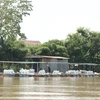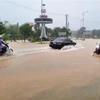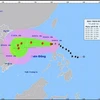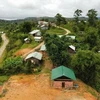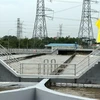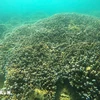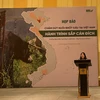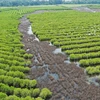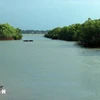The Ministry of Natural Resources and Environment in conjunction with the World Wide Fund for Nature in Vietnam held a workshop on June 26 in the Mekong Delta city of Can Tho to raise public awareness of the importance of sediment for the delta’s natural resources.
According to scientists, the delta receives about 79 million tonnes of sediment every year.
However, the construction of hydropower plans and flood-proof facilities together with intensive exploitation of sand and pebbles, deforestation and waste dumping in water resources have hugely impacted sediment sources, experts said.
The declination in sediment quantity and quality has resulted in losses of 500 hectares of land and an additional 30-40 metres of coast every year. As many as 265 erosion sites are visible along 450km of riverbanks.
Deputy Minister of Natural Resources and Environment Bui Cach Tuyen cited the rapid development of hydropower resources and socio-economic infrastructure in Mekong sub-region countries as reasons behind degrading water quality, land erosion and biodiversity reductions.
The workshop created an opportunity for scientists to share experience in effectively managing natural resources and sediment in particular.
The Ministry of Natural Resources and Environment called upon relevant departments, sectors and localities to promote awareness-raising campaigns on the significant role and sustainable management of sediment sources in the delta in combination with preserving and developing submerged areas and ecological services.
Experts suggested enhancing inter-provincial and international cooperation in the field and including sediment management in the national policy system while conducting in-depth research on sediment in the Mekong river and preventing illegal exploitation.-VNA
According to scientists, the delta receives about 79 million tonnes of sediment every year.
However, the construction of hydropower plans and flood-proof facilities together with intensive exploitation of sand and pebbles, deforestation and waste dumping in water resources have hugely impacted sediment sources, experts said.
The declination in sediment quantity and quality has resulted in losses of 500 hectares of land and an additional 30-40 metres of coast every year. As many as 265 erosion sites are visible along 450km of riverbanks.
Deputy Minister of Natural Resources and Environment Bui Cach Tuyen cited the rapid development of hydropower resources and socio-economic infrastructure in Mekong sub-region countries as reasons behind degrading water quality, land erosion and biodiversity reductions.
The workshop created an opportunity for scientists to share experience in effectively managing natural resources and sediment in particular.
The Ministry of Natural Resources and Environment called upon relevant departments, sectors and localities to promote awareness-raising campaigns on the significant role and sustainable management of sediment sources in the delta in combination with preserving and developing submerged areas and ecological services.
Experts suggested enhancing inter-provincial and international cooperation in the field and including sediment management in the national policy system while conducting in-depth research on sediment in the Mekong river and preventing illegal exploitation.-VNA







